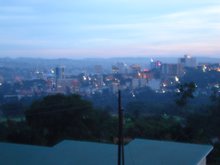Our most recent book club pick and boy, could we have picked a worse book? I never, ever would have read past the first fifty pages if I did not feel somewhat beholden to the other women who would gather at my house to discuss it. As it was I managed to read the first 100 pages straight through and then I skimmed another 100 and then I just simply had to give up. I have never been so bored with a book in my life, nor so exasperated, so utterly confused at its existence, so disappointed in a book in long time.
So what is so wrong with this book aside from being utterly boring? First, it’s about 300 pages too long. Isegawa has not just the tendency to be overwordy, but he also feels the need to repeat certain rather absurd words over and over. Like “hydra.” Every problem becomes metaphorically a hydra. Used once it could possibly be construed as somewhat clever, maybe, but after fifty times? It’s just irritating. His parents are the “despots” and his siblings are the “shitters.” Not particularly inspired, even less so after 500 pages, plus it just distances the reader from these relationships. The “shitters” develop no further personalities, no other distinguishing features than to be grouped together in this way.
There are politics buried in this book, but they are so few and far between, so in fact buried in the mundane details that fill much of the book, that they might as well not be there at all. But these details, I imagine, are what drew interest to the book in the first place. A grandfather involved in village politics. An aunt working with the NRM to build an underground opposition to Amin. The terror of living during the Amin regime. Okay, these are interesting. And yet they seem to fill less than 50 pages of this overly immense book.
My other huge problem is with perspective. Why is this a first person narration? How does our narrator know all the details of his father’s life before the narrator was born? Or anyone’s? He’s somehow completely omniscient and there’s no explanation for it. Very irritating.
There’s very little to like in this book and I keep coming back to the question of why something like this would get published and I keep thinking about
this article I read recently by David Kaiza in the East African newspaper (which I’ve linked to before and may not be available online all that much longer). In explaining the success of Abyssinian Chronicles, he said, “African literature typecast, exiled to the realms of the phantasmagorical.” Okay, I’m not actually sure where the phantasmagorical comes in Abyssinian Chronicles—maybe I just didn’t make it that far or maybe this is somehow supposed to explain the narrator’s omniscient nature—but it’s the idea that the only African literature to get published has to fit a model. It has to be about African dictators or what the Western world understands to be the African experience. It’s the best explanation I can come up with why Isegawa’s book got picked up in the first place.









